Pentagon restores Navajo Code Talkers histories after outcry
Defense Department has yet to restore history of Iowa Jima flagraiser Ira Hayes, Pima
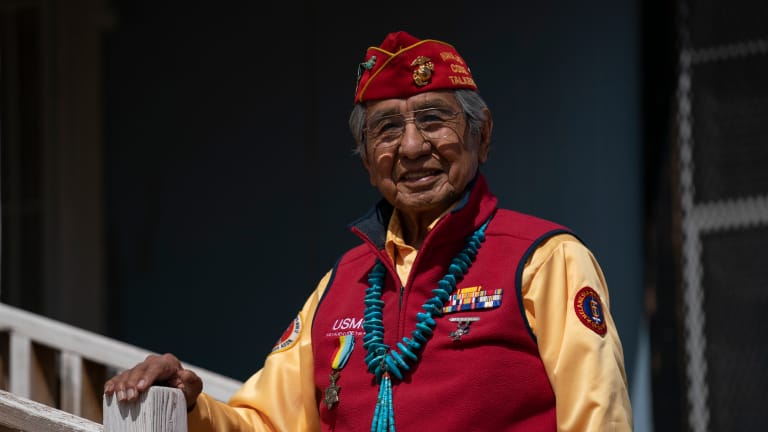
WWII veteran and Navajo Code Talker Peter MacDonald Sr. is photographed at his home on the Navajo Reservation in Tuba City, Ariz., April 28, 2020. (AP Photo/Carolyn Kaster, File)
MAR 20, 2025
Terry Tang
Associated Press
PHOENIX — The Pentagon restored some webpages highlighting the crucial wartime contributions of Navajo Code Talkers and other Native American veterans on Wednesday, days after tribes condemned the action.
The initial removal was part of a sweep of any military content that promoted diversity, equity and inclusion, or commonly referred to as DEI. Following President Donald Trump’s broader executive order ending the federal government’s DEI programs, the Defense Department deleted thousands of pages honoring contributions by women and minority groups. Department officials say the Navajo Code Talker material was erroneously erased.
“In the rare cases that content is removed — either deliberately or by mistake — that is out of the clearly outlined scope of the directive, we instruct the components and they correct the content so it recognizes our heroes for their dedicated service alongside their fellow Americans, period,” Pentagon press secretary John Ullyot said in a statement.
Several webpages on the Code Talkers landed on a “404 - Page not found” message Tuesday. Some were back up Wednesday — although any that also mention Native American Heritage Month remain down. Thousands of other pages deleted in the DEI purge are still offline.
White House officials informed the Navajo Nation that an artificial intelligence-powered automated review process looking for content with DEI initiatives led to the elimination of anything mentioning “Navajo," according to a statement from Navajo Nation President Buu Nygren.
Nygren, who sent a letter to the Defense Department requesting clarity on the issue, said he's pleased by the resolution.
“I want to assure the Navajo people that we remain in close communication with federal officials to ensure the legacy of our cherished Navajo Code Talkers is never erased from American and Navajo history,” Nygren said.
He also pointed out the 574 federally recognized tribes across the U.S. are sovereign nations and not defined by DEI classifications, a stance broadly supported by other Native American leaders who also sent letters to the Trump administration.
The U.S. Marine Corps initially recruited 29 Navajo men to develop a code based on the unwritten Navajo language in World War II. Using Navajo words for red soil, war chief, clan, braided hair, beads, ant and hummingbird, for example, they came up with a glossary of more than 200 terms, later expanded, and an alphabet. To convey the word “send,” Code Talkers would say the Navajo words for “sheep, eyes, nose and deer.”
Hundreds of Navajos followed in their footsteps, sending thousands of messages without error on Japanese troop movements, battlefield tactics and other communications crucial to the war’s ultimate outcome. The code stumped Japanese military cryptologists.
The Code Talkers participated in all assaults the Marines led in the Pacific from 1942 to 1945 and are credited with helping the U.S. win the war. Hundreds of Native Americans from more than 20 tribes also served as code talkers during World War I and World War II, according to the Smithsonian's National Museum of the American Indian. Among them were Choctaw, Cherokee, Osage, Chippewa and Hopi speakers.
Among those alarmed to hear of the missing Navajo Code Talker webpages was Peter MacDonald, 96. He and Thomas H. Begay are the only two Navajo Code Talkers still living today.
“That code became a very valuable weapon and not only saved hundreds of thousands of soldiers, but it also helped win the war in the Pacific,” MacDonald said by phone from his home in Tuba City in the Arizona portion of the Navajo Nation. "And it has absolutely nothing to do with DEI."
A Republican who voted for Trump, MacDonald said he thinks the current administration needs to better walk the line between getting rid of DEI and ignoring history.
“That’s why I’m very concerned that communication from the Pentagon down to the various military units should be taught or learn that this information is history, and you don’t want to hide history,” MacDonald said.
The Defense Department has had to issue reassurances that it is not omitting historic achievements by servicemen and women of color. Besides the Code Talkers, the agency also on Wednesday restored a webpage describing baseball and civil rights icon Jackie Robinson’s military service after it was missing earlier in the day. Last week, pages honoring a Black Medal of Honor winner and Japanese American service members were also restored.
“Everyone at the Defense Department loves Jackie Robinson, as well as the Navajo Code Talkers, the Tuskegee airmen, the Marines at Iwo Jima and so many others — we salute them for their strong and in many cases heroic service to our country, full stop,” Ullyot said. “We do not view or highlight them through the prism of immutable characteristics, such as race, ethnicity or sex.”
Michael Smith, whose father, Samuel “Jesse” Smith Sr., was a Navajo Code Talker, questioned why these pages were removed at all.
“I don’t know how taking Navajo Code Talkers off the Department of Defense website is saving the United States any money because that’s not consistent with the president’s order,” said Smith, who helps organize annual celebrations of the Code Talkers.
Gov. Stephen Roe Lewis of the Gila River Indian Community in Arizona also expressed disappointment, claiming there was missing content relating to all Native American veterans, including Ira Hayes. Hayes was an enrolled member of the tribe and one of six Marines featured in an iconic 1945 Associated Press photograph of U.S. forces raising an American flag during the Battle of Iwo Jima. As of March 20, Hayes' history page had yet to be restored.
Even with some being reposted, he remains worried web content removal is “the tip of the iceberg.”
“The way it looks in the (executive) order, this language is skewed and made to sound like the diversity programs are the ones that are unethical," Smith said.
Department of Defense deletes Code Talkers, Iwo Jima flag raiser Hayes under Trump’s DEI order
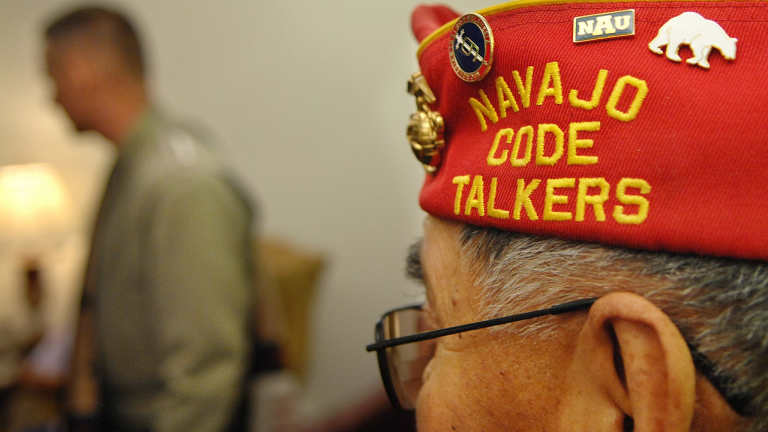
Navajo Code Talkers and their family members met with Chairman of the Joint Chiefs of Staff U.S. Marine Corps Gen. Peter Pace at the Pentagon, Aug. 10, 2007. (Photo by U.S. Air Force Staff Sgt. D. Myles Cullen | Public domain)
SHONDIIN SILVERSMITH AND ARIZONA MIRROR
MAR 19, 2025
Prominent Native American figures in U.S. military history have been erased from the U.S. Department of Defense’s website as part of the sweeping effort stemming from President Donald Trump’s executive order banning diversity, equity and inclusion.
The Department of Defense website removed articles featuring details about the Navajo Code Talkers — Navajo men who served during World War II and used their language as a secret code in battle — along with U.S. Marine Ira Hayes from the Gila River Indian Community, who helped raise the flag during the Battle of Iwo Jima in World War II.
“Navajo code has absolutely nothing to do with DEI because Navajo code was a weapon,” Navajo Code Talker Peter MacDonald said in response to the removal during an interview with the Arizona Mirror.
MacDonald, 96, is one of two living Navajo Code Talkers. He served in the South Pacific as a Code Talker and in North China with the 6th Marine Division.
MacDonald said that dismissing the Navajo Code Talkers as DEI is a “terrible misinterpretation by the United States.”
The complex Navajo language was used as a weapon in World War II against the enemy because the Japanese were breaking every military code that U.S. troops were using in the Pacific theater.
It took the Navajo people to develop a whole new code in the Navajo language, he added, and “it became the only military code in modern history never broken by an enemy.”
In a general keyword search on Tuesday of the Department of Defense’s website for the Navajo Code Talkers, only eight results appeared, but none related to information or articles detailing their role in World War II.
Zero results appeared in a search for Ira Hayes.
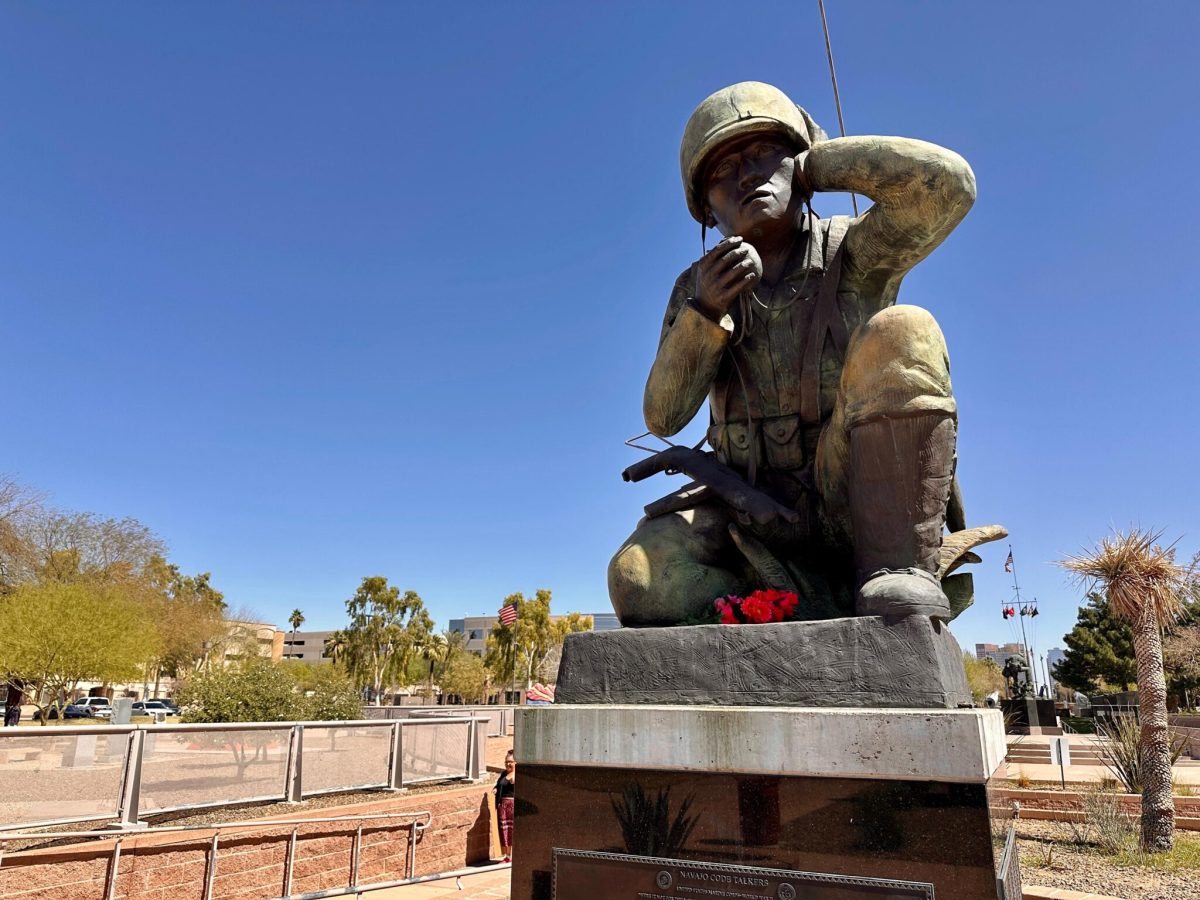
Ira Hayes is memorialized in a monument at Wesley Bolin Plaza in Phoenix. (Photo by Shondiin Silversmith, Arizona Mirror)
“The Navajo Code Talkers earned their place in history through their courage and sacrifice, giving their lives in defense of this nation,” Navajo Nation Council Speaker Crystalyne Curley said in a press release. “Erasing their extraordinary contributions from formal military history is not only disrespectful, it is dishonorable.”
Having articles and information about the Navajo Code Talkers on the department’s website is the right thing, MacDonald said, because it provides education for everyone that weapons do not just include guns but language.
He added that their weapon helped preserve America’s freedom, and “we were happy to use that weapon to help.”
“It’s important for the entire nation to know that the Navajo Code has absolutely nothing to do with DEI,” he said. He hopes the Pentagon will return all the content so they can learn.
In an email response to the Arizona Mirror, a Department of Defense spokesperson who wouldn’t provide their name said the DOD is in the process of restoring the content about the Navajo Code Talkers, which had been removed during the auto-removal process.
No time frame was provided for restoring the content, and the spokesperson did not respond to questions about the deleted content related to Ira Hayes.
Ronald Kinsel, the son of the late Navajo Code Talker John Kensel, Sr., said he was shocked to learn that all articles featuring the Navajo Code Talkers had been removed.
“My dad didn’t go to war for nothing,” he said, adding that the United States wouldn’t be the country it is now if it wasn’t for the Navajo Code Talkers.
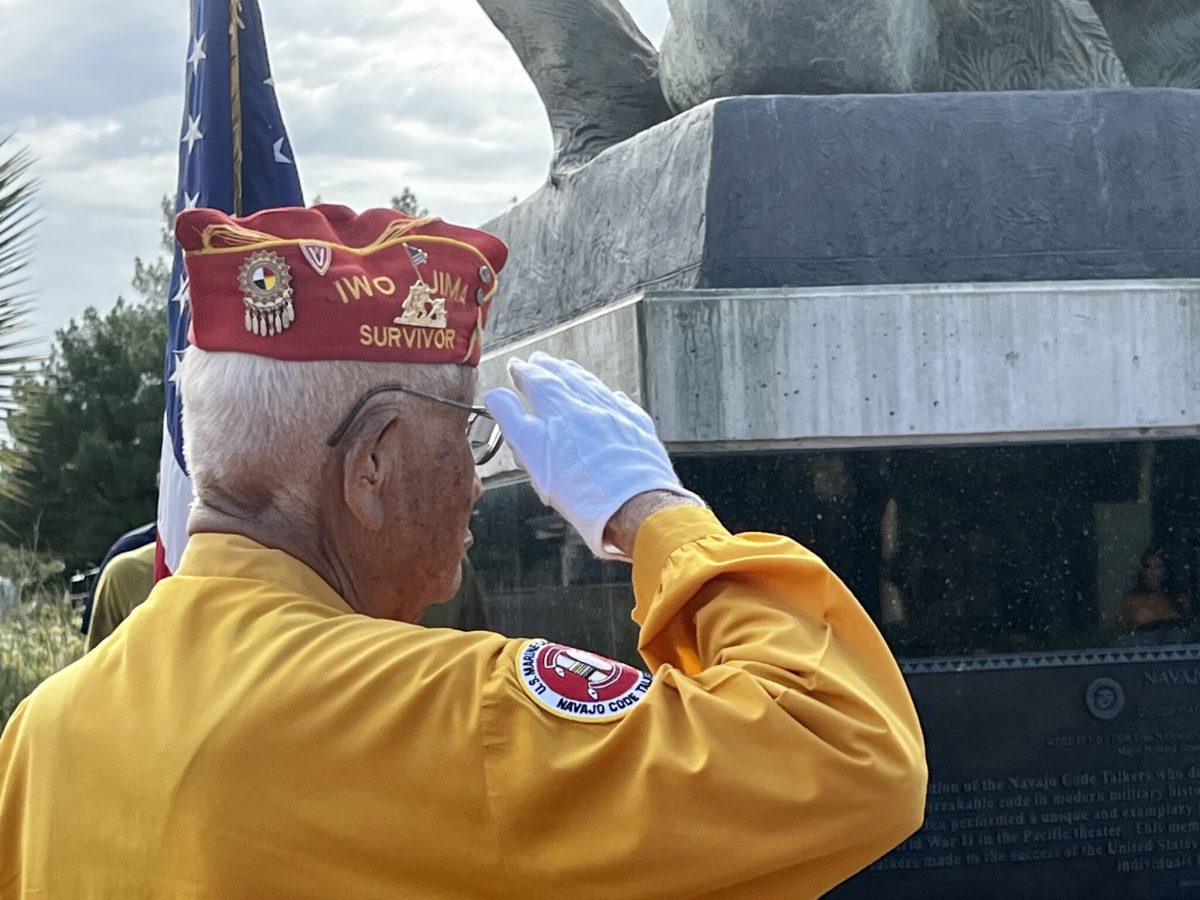
Navajo Code Talker Thomas H. Begay salutes the Navajo Code Talker Memorial Statue during the National Navajo Code Talkers Day celebration on Aug. 14, 2022.
(Photo by Shondiin Silversmith, Arizona Mirror)
The Navajo Code Talkers participated in all assaults led by the U.S. Marines in the Pacific from 1942 to 1945, including Guadalcanal, Tarawa, Peleliu and Iwo Jima. The total number of Navajo Code Talkers who served in the U.S. Marines is unknown, but it is estimated to be between 350 and 420.
MacDonald’s daughter, Charity, said she wasn’t shocked by the removal. It is merely a new form of erasure of Indigenous people, something the United States has done throughout its history.
“You can not erase an entire history of people,” she said, especially today when information can be accessed in various ways.
“Our federal government is doing this purposely,” Charity said, adding that it’s an action they’re taking to show people that they can.
“The federal government is making a statement, saying that this is how they feel,” she added.
Charity said Indigenous people have given a lot to the federal government, and during World War II, the military came to the Navajo people and asked them for help.
“They used the Navajo language to help them win the war,” she said.
Navajo Nation, Gila River Indian Community respond
Leaders from the Navajo Nation and the Gila River Indian Community sent letters to the Department of Defense to ask why the details about the Navajo Code Talkers and Hayes were deleted.
Gila River Indian Community Gov. Stephen Roe Lewis said removing information about Hayes and the Navajo Code Talkers due to the scrubbing for DEI initiatives is “misguided” and “irresponsible.”
Lewis said his tribe sent a official letter to the Department of Defense on Tuesday but have not received a response.
“Sadly, we’re no strangers to being erased,” Lewis said, noting it has happened to Indigenous peoples throughout history.
“All the stories of Ira Hayes and all Native veterans, including the code talkers, have to be rectified ASAP,” he said.
Lewis said Hayes is a significant figure in military history, and members of the Gila River Indian Community learn about him from a very young age.
Hayes, alongside five other Marines, raised the U.S. flag on the island of Iwo Jima at the summit of Mount Suribachi on February 23, 1945. He was part of the 5th Marine Division and fought in the Battle of Iwo Jima until the island was secured on March 26, 1945.
The photograph of the flag raising during the Battle of Iwo Jima is one of the most iconic images of World War II, taken months into the battle by Associated Press photographer Joe Rosenthal.
Lewis said Hayes’ story and the image of the Marines raising the flag at Iwo Jima is historic for Native military service.
“Native Americans have always served in our country’s military, in all branches, at the highest levels of any other group,” Lewis said.
Indigenous people across the United States serve in the armed forces at five times the national average, according to the National Indian Council on Aging, and have served with distinction in every major conflict for over 200 years.
Lewis said that recognizing the patriotism and courage of Native American soldiers has nothing to do with any type of DEI initiative.
“It’s simply an offering of respect for extraordinary service and bravery in the line of duty,” he added.
Navajo Nation President Buu Nygren sent a letter to Defense Secretary Pete Hegseth on Tuesday asking him to explain the removal of the Navajo Code Talkers’ information from military websites.
“Appropriately recognizing the work of the Navajo Code Talkers is profoundly significant to the Navajo Nation,” Nygren said in his letter, requesting the rationale behind the removal.
In the letter, Nygren wrote about how Trump welcomed the Navajo Code Talkers to the White House in 2017, during his first term in office, and praised their contributions to the country.
“We sincerely appreciate this recognition and believe it highlights the importance of preserving the history and legacy of the Navajo Code Talkers,” he wrote.
“Given the profound impact and historic importance of these American heroes, it is imperative that their legacy remains visible and accessible to all Americans,” the letter stated.
The Navajo Nation Council voiced its disappointment in the removal of the Code Talkers, emphasizing that the Navajo Nation is not a racial group but a distinct political entity.
“The Navajo Nation Council is deeply concerned by being conflated into DEI initiatives that fail to recognize our unique political status,” Curley said in a press release. The Navajo Nation Council is engaging with the administration to clarify the reasoning behind removing articles.
“The United States would not be the nation it is today without the bravery and service of the Navajo Nation Code Talkers,” Curley said. “Their legacy is a cornerstone of American history, and it is essential that their contributions be honored and recognized.”

SHONDIIN SILVERSMITH is an award-winning Native journalist with AZ Mirror. Silversmith has covered Indigenous communities for more than 10 years, and covers Arizona's 22 federally recognized sovereign tribal nations, as well as national and international Indigenous issues. Follow DiinSilversmith
Arizona Mirror is part of States Newsroom, the nation’s largest state-focused nonprofit news organization.
Arizona Mirror is part of States Newsroom, the nation’s largest state-focused nonprofit news organization.
Trump's DEI Executive Order Prompts the Removal of Navajo Code Talkers from Some Military Websites
Yahoo News
Native News Online
Yahoo News
Native News Online
March 17, 2025
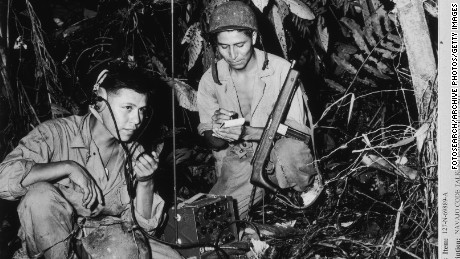
The code developed by the Navajo Marines during WWII was never broken.
Native American Code Talkers are highly revered across Indian Country for their patriotism and service to the United States. During World War II, Navajo Code Talkers, a group of Diné citizens serving in the U.S. Marine Corps, used the Navajo language to securely transmit classified tactical messages.
On Monday, in an exclusive article, Axios reported articles about the renowned Native American Code Talkers have disappeared from some military websites, with several broken URLs now labeled "DEI."
Axios identified at least 10 articles mentioning the Code Talkers that had disappeared from the U.S. Army and Department of Defense websites as of Monday.
During World War II in the South Pacific theater, the Navajo Code Talkers used a secret code that was never broken by the Japanese, enabling the United States military to communicate securely and ensure victory. The Navajo language secured military communication lines that allowed Marines to advance on the battlefields of the Pacific Theater.
The original group of 29 Navajo Code Talkers transmitted information about tactics, troop movements, orders, and other battlefield messages using telephones and radios. Their work was so successful that by the end of World War II, more than 400 Navajos were called upon to serve as Code Talkers. The code has never been broken. The story about the contributions to save democracy remained classified until 1968.
This rich history has been diminished due to a Trump executive order aimed at removing Diversity, Inclusion, and Equity (DEI) initiatives throughout the federal government.
Asked about the missing pages, Pentagon Press Secretary John Ullyot replied in a statement: "As Secretary [Pete] Hegseth has said, DEI is dead at the Defense Department. ...We are pleased by the rapid compliance across the Department with the directive removing DEI content from all platforms."
The irony of the erasure is one of the far right’s heroic presidents, Ronald Reagan in 1982 declared August 14th as "National Navajo Code Talkers Day" to honor the contributions of the Navajo Code Talkers.

The code developed by the Navajo Marines during WWII was never broken.
file photoBy Levi Rickert
Native American Code Talkers are highly revered across Indian Country for their patriotism and service to the United States. During World War II, Navajo Code Talkers, a group of Diné citizens serving in the U.S. Marine Corps, used the Navajo language to securely transmit classified tactical messages.
On Monday, in an exclusive article, Axios reported articles about the renowned Native American Code Talkers have disappeared from some military websites, with several broken URLs now labeled "DEI."
Axios identified at least 10 articles mentioning the Code Talkers that had disappeared from the U.S. Army and Department of Defense websites as of Monday.
During World War II in the South Pacific theater, the Navajo Code Talkers used a secret code that was never broken by the Japanese, enabling the United States military to communicate securely and ensure victory. The Navajo language secured military communication lines that allowed Marines to advance on the battlefields of the Pacific Theater.
The original group of 29 Navajo Code Talkers transmitted information about tactics, troop movements, orders, and other battlefield messages using telephones and radios. Their work was so successful that by the end of World War II, more than 400 Navajos were called upon to serve as Code Talkers. The code has never been broken. The story about the contributions to save democracy remained classified until 1968.
This rich history has been diminished due to a Trump executive order aimed at removing Diversity, Inclusion, and Equity (DEI) initiatives throughout the federal government.
Asked about the missing pages, Pentagon Press Secretary John Ullyot replied in a statement: "As Secretary [Pete] Hegseth has said, DEI is dead at the Defense Department. ...We are pleased by the rapid compliance across the Department with the directive removing DEI content from all platforms."
The irony of the erasure is one of the far right’s heroic presidents, Ronald Reagan in 1982 declared August 14th as "National Navajo Code Talkers Day" to honor the contributions of the Navajo Code Talkers.
No comments:
Post a Comment